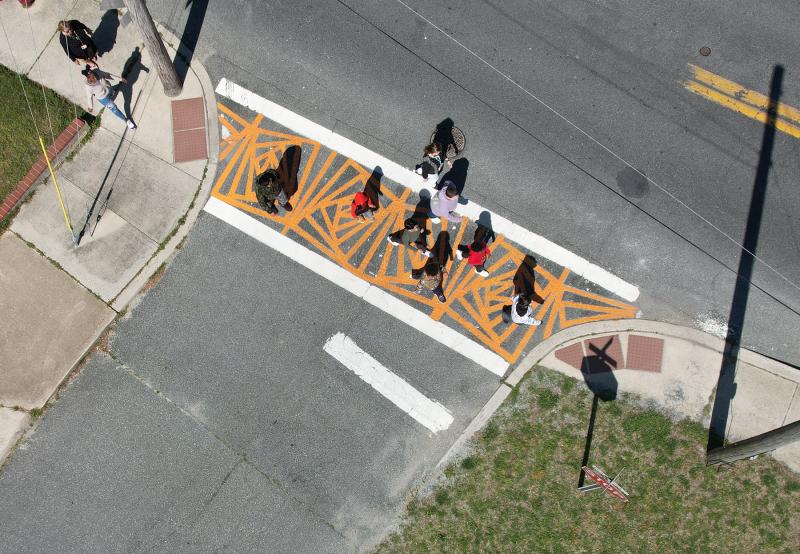Through the month of October, 24 pedestrians have been killed on Delaware’s roadways. That exceeded the number of deaths through the same point in 2023.
“We’re alarmed by that trend,” said Charles “CR” McLeod, director of community relations for the Delaware Department of Transportation. “This has been an issue we’ve been investing a lot of time, resources and money into to help make our pedestrian network safer.”
The issue of pedestrian safety was the topic for the third episode of “On the Road with DelDOT.” McLeod, who hosts the podcast, was joined by DelDOT planners Maria Andaya and Kelly Valencik.
Andaya said she dove into the data and found pedestrian fatalities have been an issue in Delaware since the advent of motorized vehicles. Only in 2010 did the state adopt the Complete Streets policy that ensures facilities for bicyclists and pedestrians are included with each transportation project.
“Since the 1920s, we’ve been building roads for cars to go place to place,” said Valencik. “We haven’t been prioritizing our vulnerable road users.”
Those users are people not protected in a vehicle, such as people walking, bicycling or, in the 21st century, riding electric scooters.
“Unfortunately, [those facilities] weren’t built into the designs of the past, so we’ve built these high-speed, multi-lane highways that don’t have safe crossing opportunities for people to get from place to place,” she said.
Andaya said data shows the majority of pedestrian crashes and fatalities happen between dusk and dawn, and most people are wearing dark-colored clothing. She said it’s not enough to wear light-colored clothing; pedestrians should wear something reflective that alerts drivers earlier.
Since the adoption of the Complete Streets program, DelDOT has not only put an emphasis on pedestrian safety in its projects, but also requires developers who need access to a state-maintained roadway to accommodate pedestrians and bicyclists.
McLeod said the goal is to create low-stress areas where pedestrians and bicyclists are separated from the roadway.
“We want to remove them from the roadways as much as possible,” he said. “For any project happening around our state, you’ll likely see a separated pathway, a sidewalk, a designated crossing area. They’re all built into the work we’re doing. That wasn’t always the case.”
He said the phrase sidewalk to nowhere is often used, but the goal is to connect the network as much as possible.
Areas that are already developed present challenges to DelDOT planners, because there are limited opportunities to improve safety. However, one shining example is what’s occurred in Dewey Beach the last few years. With the state’s main north-south road cutting straight through the town, DelDOT had to figure out a way to funnel the thousands of pedestrians to designated crossing areas. They did so by working with the town to build an aesthetically pleasing barrier in the center median using posts and ropes. They also added rectangular rapid-flashing beacons and improved lighting.
The result is better safety for pedestrians, and drivers also now know where to look for them.
“They’re not darting out in front of cars at any given spot,” McLeod said. “We continue to look at how to improve pedestrian accessibility in those areas. Providing options for people to move safely is the goal here.”
To keep pedestrian safety top of mind statewide, the Pedestrian Council was formed. Although a similar council was created in 2007, it folded after a pedestrian plan was developed. After an all-time high in pedestrian fatalities – 36 – occurred in 2015, then-Gov. Jack Markell reestablished the council. It was finally codified last year.
The council meets four times a year, with membership comprising representatives from all three counties, various state agencies, disability groups and members of the public, among others.
McLeod said public participation is an important part of the process.
“We need that feedback,” he said. “We need to know what they’re seeing and experiencing as pedestrians.”
Recently, subcommittees were formed. The first will address land use. The goal is to provide recommendations to the state and DelDOT on how to improve land-use decisions.
McLeod said the council’s work is important.
“We have a lot of projects going on throughout the state – it’s not all just roads and bridges,” he said. “We have a lot of important projects that are addressing all modes of transportation.”
To view the latest episode of “On the Road with DelDOT,” go to tinyurl.com/395md2rt.



















































